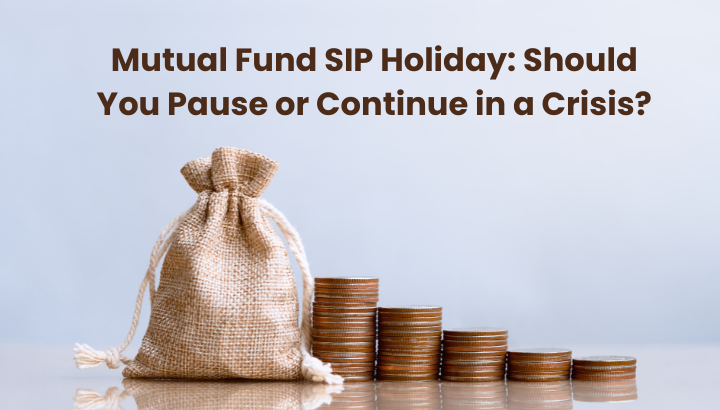Mutual Fund SIP Holiday Should You Pause or Continue in a Crisis? Whenever there are ups and downs in the market or your finances take a hit, the idea of pausing your SIP (Systematic Investment Plan) might look like a smart choice. But is opting for Mutual Fund SIP Holiday in India really a good idea for your mutual funds investment in India? Let’s solve this confusing part in simple terms, so that you can make decisions related to your SIP investments.
What is a Mutual Fund SIP Holiday?
Many fund houses in India let the investors to pause their SIPs for a few months without canceling them permanently. This is called a SIP Holiday, which gives you flexibility during unexpected turns of events like job loss, medical emergencies, or a downturn in the market.
You can learn more about SIP pause rules from SEBI
Should You Take a SIP Holiday?
Before you hit the pause button for your SIPs, you need to consider the bigger picture. Here are some key pros and cons of taking a SIP holiday:
Pros of a SIP Holiday:
Relief for a short period, if you are running short on cash to make your SIP installment.
No extra charge or exit load for pausing your SIPs.
You keep away from the involuntary withdrawals.
Cons of a SIP Holiday:
You miss buying more shares when the market is down, which can ruin your rupee cost averaging strategy.
It breaks the discipline towards regular investment.
Delays wealth creation and your financial goals for the future.
Why Staying Invested is Often Better
Pausing your SIPs investments during market crisis might feel safe option, but part performance shows that staying with your SIPs can give you better long-term results, here’s the reason why:
Rupee Cost Averaging: When markets fall, then your same SIP amount buys more shares, which lowers the averaging cost.
Compounding Effect: Even small gaps can reduce the final corpus because of the power of compounding, in which it turns small investments into a large corpus over time.
Market Recovery: Markets bounce back most of the time and if you skip investing during market dips, then you might miss the rebound.
For more insights, check out AMFI’s SIP FAQs to understand the benefits of staying invested.
https://www.investgloo.com/how-to-use-swp-systematic-withdrawal-plan-for-regular-income/
What to Do Instead of Pausing
If you are really experiencing a shortage, consider these smart moves before stopping your SIP:
Decrease the amount of SIP you invest rather than completely pausing it.
Take another look at the expenses and cut back on wants vs needs.
Make sure to keep an emergency fund for unexpected turns of events.
If you are still not sure, then it’s a wise idea to consult a professional financial advisor who is registered with SEBI to rebalance your best mutual fund portfolio strategy for 2025 if needed.
How to Choose the Right SIP Strategy
Choosing the ideal mutual fund investment in India and SIP amount matters more than timing the market. Here are some quick and simple tips:
Align mutual funds to your financial goals like equity fund for long-term and debt fund for short-term.
Diversify your funds to balance the risks and returns.
Review your fund every 6 months or once a year and adjust it if needed.
Follow expert advice on how to choose the right mutual fund in India from a SEBI-registered advisor according to your risk taking capability.
Final Thoughts
A crisis in the market may lead you to stop your SIP, but staying invested in your mutual funds investment in India can be your biggest strength in the long-term. So, take a second look before taking a SIP Holiday. Because, to do nothing is sometimes the best thing.
Stay disciplined. Stay invested for the long–run. Grow your wealth wisely.

